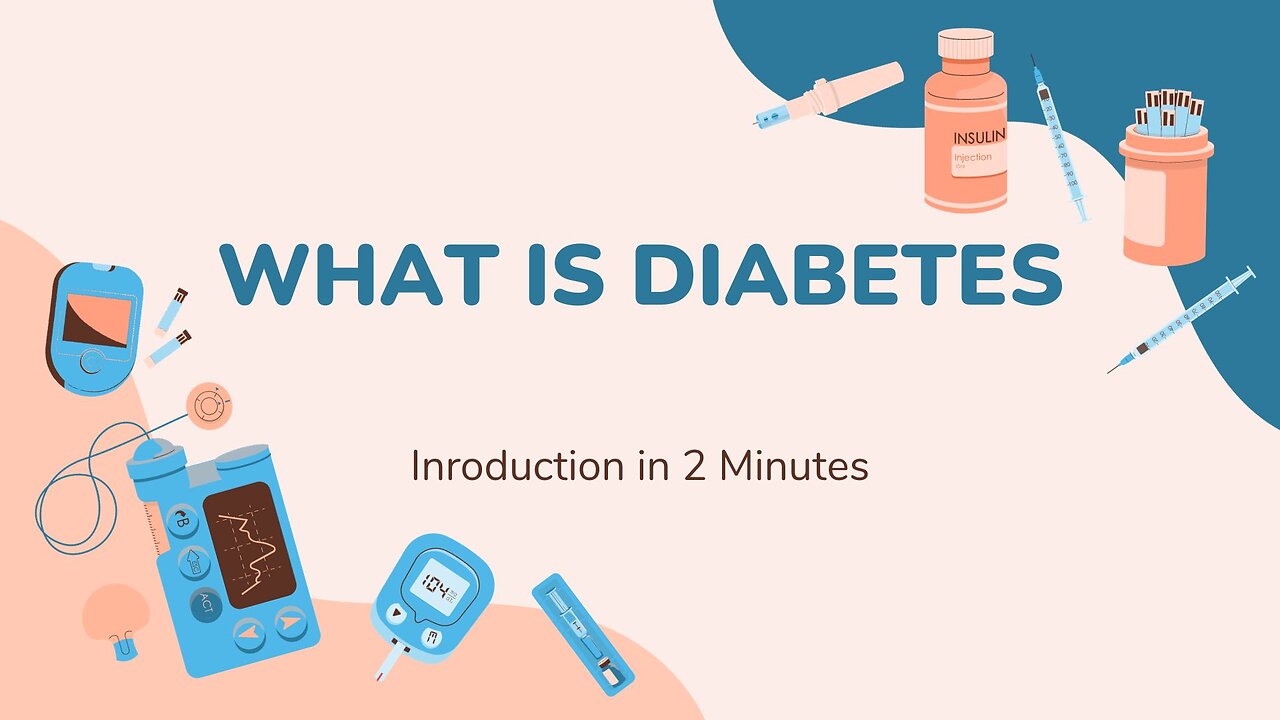Premium Only Content

What is Diabetes in 2 Minutes.
Diabetes is a chronic medical condition characterized by elevated levels of glucose (sugar) in the blood. This happens when the body either doesn't produce enough insulin or can't effectively use the insulin it produces. Insulin is a hormone produced by the pancreas that helps regulate blood sugar levels by allowing glucose to enter cells, where it is used for energy.
There are three main types of diabetes:
Type 1 Diabetes: This is an autoimmune condition where the immune system mistakenly attacks and destroys the insulin-producing beta cells in the pancreas. People with Type 1 diabetes require lifelong insulin therapy to manage their blood sugar levels. It typically develops in childhood or early adulthood.
Type 2 Diabetes: This is the most common form of diabetes and is often associated with lifestyle factors such as obesity, physical inactivity, and poor diet. In Type 2 diabetes, the body doesn't use insulin effectively (insulin resistance) or doesn't produce enough insulin to meet its needs. It can be managed with lifestyle changes, oral medications, and sometimes insulin injections.
Gestational Diabetes: This type of diabetes occurs during pregnancy when the body cannot produce enough insulin to meet increased needs. It usually resolves after childbirth, but women who have had gestational diabetes are at a higher risk of developing Type 2 diabetes later in life.
Diabetes can lead to various health complications if not properly managed. High blood sugar levels over time can damage organs and systems in the body, including the heart, blood vessels, nerves, kidneys, and eyes. Managing diabetes typically involves monitoring blood sugar levels, making dietary and lifestyle changes, taking medications (in some cases), and maintaining a healthy weight. Regular medical check-ups and consultations with healthcare providers are essential for effective diabetes management.
-
 32:19
32:19
SB Mowing
9 days agoA Backyard She’s NEVER Seen – Now Safe for the Kids to Play!
20K16 -
![[Day 26] CS Blast bounty baby](https://1a-1791.com/video/fwe2/8a/s8/1/Z/H/j/_/ZHj_w.0kob-small-Day-26-CS-Blast-bounty-baby.jpg) 2:09:11
2:09:11
ggezlol_tv
4 hours ago[Day 26] CS Blast bounty baby
37.2K1 -
 2:32:17
2:32:17
Sgtfinesse
4 hours ago💥Sunday Morning Hunt for Featherweight Artifact | New World PVP Server: Sclavia
39.4K2 -
 11:25
11:25
Film Threat
20 hours agoLET'S DISCUSS THE 2025 OSCAR NOMINATIONS | Film Threat News
31.5K9 -
 13:07
13:07
DEADBUGsays
4 hours agoThe Southport Massacre, The Great British Cover-Up
29.4K15 -
 25:26
25:26
hickok45
7 hours agoSunday Shoot-a-Round # 265
25.1K26 -
 30:55
30:55
Tundra Tactical
18 hours ago $17.66 earnedFaith, Family, Gun Rights : Tundra Tactical Interviews Erich Pratt Vice President Of GOA
104K31 -
 24:08
24:08
MYLUNCHBREAK CHANNEL PAGE
1 day agoUnder The Necropolis - Pt 4
240K80 -
 1:26:44
1:26:44
Tactical Advisor
1 day agoTrump Starting Strong/Shot Show Recap | Vault Room Live Stream 015
130K10 -
 49:13
49:13
SGT Report
1 day agoGILDED CAGE: A.I. PRODUCED MRNA VACCINES & THE ROAD TO HELL -- Sam Anthony
82.9K450